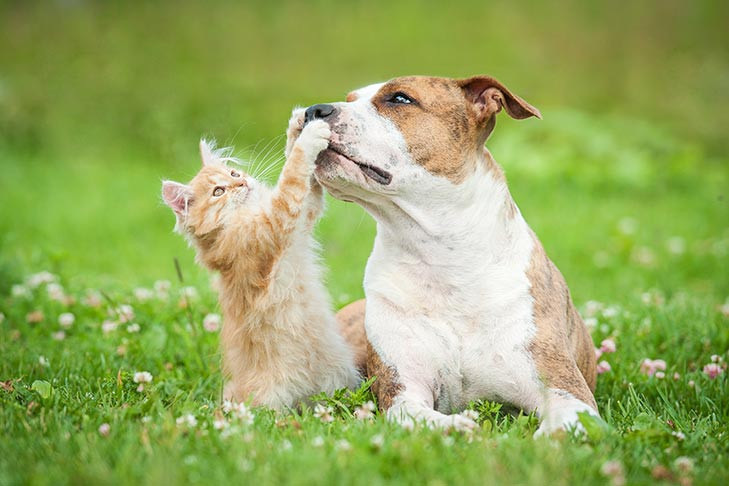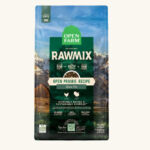It’s a scene familiar to many dog owners: you’re enjoying your yard with your canine companion, only to catch them sneaking a snack from a less-than-appetizing source – the cat’s litter box droppings. You might ask yourself in disgust, “Why Do Dogs Eat Cat Poop?” While it’s certainly not a behavior humans appreciate, this habit is rooted in natural canine instincts. The simple truth is, dogs are often attracted to the strong smells emanating from cat feces, which can unfortunately make cat poop, and even cat food, quite appealing to them.
The Canine Fascination with Feline Feces: Why Dogs Are Drawn to Cat Poop
Dogs are notorious for their less-than-discriminating palates. Many dogs seem to have a penchant for consuming all sorts of unsavory items, and eating poop, scientifically known as coprophagia, is a common example. This behavior stems from their evolutionary history as scavengers. In the wild, dogs survived by eating whatever they could find, and this instinct remains strong in our domesticated companions. Just as dogs might be tempted by garbage, discarded food, or even inanimate objects like socks or toys, cat poop can become another item on their scavenging menu.
But why cat poop specifically? The answer often lies in the aroma. What smells revolting to us can be quite enticing to a dog’s powerful nose. Cat poop, particularly if the cat food is high in protein, retains a strong smell that closely resembles cat food itself. Given that many dogs are also drawn to eating cat food, the allure of cat poop becomes clearer. It’s essentially a pre-digested form of something they already find appealing.
Furthermore, coprophagia in dogs can sometimes be linked to nutritional deficiencies, although this is less common in dogs fed a balanced diet. In most cases, it’s simply a matter of canine exploration and opportunistic eating that can unfortunately develop into a persistent habit. It’s also worth noting that for mother dogs, consuming the feces of their puppies is a normal maternal behavior, helping to keep the den clean and potentially protect pups from parasites in their early weeks.
Is Eating Cat Poop Harmful to Dogs? Potential Health Risks
While the idea of your dog snacking on cat waste is unpleasant, it’s crucial to consider the potential health implications. Is cat poop actually bad for dogs? The answer is, potentially yes. While some dogs may indulge in this habit without immediate adverse effects, consuming any kind of feces carries inherent risks of bacterial and parasitic infections.
One significant concern is the transmission of harmful bacteria. Cat poop can harbor bacteria like Salmonella and E. coli, which can cause gastrointestinal upset in dogs, leading to symptoms like vomiting and diarrhea. Worryingly, some of these bacteria, such as Salmonella, are zoonotic, meaning they can be transmitted from animals to humans. This poses a health risk to you and your family if your dog carries these bacteria after eating cat poop.
Internal parasites are another significant threat. Dogs can contract various internal parasites from ingesting cat feces, including roundworms, hookworms, and Giardia. It’s important to remember that even if your cat appears healthy and shows no signs of parasites, they can still be carriers and shed parasite eggs in their feces.
 American Staffordshire Terrier and kitten playing together outdoors
American Staffordshire Terrier and kitten playing together outdoors
Beyond biological hazards, cat litter itself presents a risk if ingested in large quantities. Clumping cat litters, in particular, can cause intestinal blockages if a dog eats a significant amount. While a small nibble of litter is unlikely to cause serious problems, it’s wise to monitor your dog if you suspect they’ve consumed cat litter. Signs of a potential blockage include difficulty pooping or constipation, absence of bowel movements, abnormal poop, lethargy, vomiting, and abdominal pain. If you observe any of these symptoms, immediate veterinary attention is crucial.
Despite these potential risks, it’s true that many dogs will eat cat poop occasionally and experience no noticeable health issues. However, the potential downsides, both for your dog’s health and your own, make it a habit that’s best discouraged.
How to Stop Your Dog from Eating Cat Poop: Prevention Strategies
Fortunately, there are several effective strategies to prevent your dog from indulging in this undesirable behavior. The most straightforward approach, and often recommended by veterinarians, is to simply restrict your dog’s access to the cat litter box.
Strategic placement of the litter box is key. If possible, locate the litter box in an area that is inaccessible to your dog but easily accessible to your cat. A separate room with a baby gate or dog gate can be highly effective. These gates allow cats to jump over or pass through small openings while keeping larger dogs out, simultaneously providing your feline friend with a safe and private space.
If physical separation isn’t feasible, consider investing in litter box solutions designed to deter dogs. Covered cat litter boxes with enclosed tops significantly limit access, making it much harder for dogs to reach the contents. Another excellent option is a “dog-proof” top-entry cat litter box. These designs require cats to enter from the top, which is generally too awkward for dogs to navigate.
For outdoor scavenging, especially if neighborhood cats are using your yard as a toilet, prevention becomes trickier. In such cases, you might explore cat repellents to discourage cats from entering your property. However, the effectiveness of these repellents can vary. Regular yard clean-up is also important to remove any accessible poop. If your dog has a habit of outdoor scavenging, routine veterinary check-ups, including fecal parasite testing, are crucial to ensure they remain healthy and parasite-free.
In conclusion, while coprophagia, specifically eating cat poop, is a disgusting habit for us, it’s often a normal canine behavior driven by instinct and olfactory attraction. Although not always immediately harmful, it does carry potential health risks for your dog and even for you. By implementing preventative measures, you can effectively curb this behavior and protect your dog’s health and well-being. If you have concerns or need further advice, consulting with your veterinarian is always recommended.

